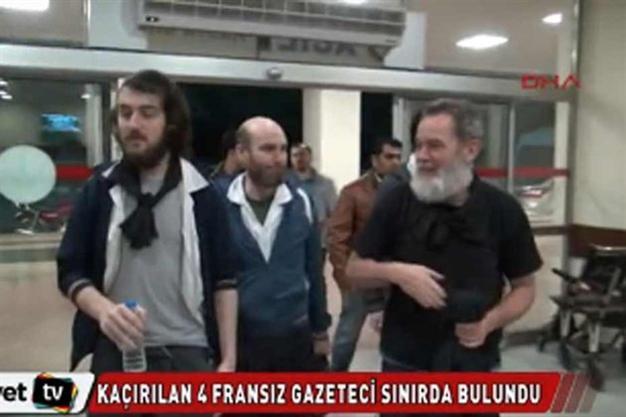Four French journalists found by Turkish soldiers on Syria border
Doğan News Agency - Anadolu Agency

Footage of the journalists broadcast on Turkish television showed them looking unkempt, with beards and long hair, but they appeared to be in good health. (Still from Doğan News Agency footage)
Four French journalists were found by Turkish soldiers on the border with Syria on April 19 after being kidnapped by the rebel group Islamic State of Iraq and the Levant (ISIL) in Syria last June, Doğan News Agency reported.Journalists Nicolas Henin, Pierre Torres, Edouard Elias and Didier François were found in Şanlıurfa province with their hands and eyes bound, the agency said.
An unknown group brought the journalists to the Turkish border last night, the news agency reported. They will be taken to hospital before being handed over to French officials, it said.
An Anadolu Agency correspondent in Şanlıurfa saw Elias, 22, François, 54, Torres, 29, and Henin, 38, welcomed by Turkish soldiers.
French President François Hollande said in a statement that the men were in good health, "in spite of the very grueling conditions of their captivity."
François, a senior war correspondent working for Europe 1 radio, and Elias, a photographer, were kidnapped in early June on their way to the Syrian city of Aleppo. Henin, who was working for Le Point magazine and Torres, reporting for French-German television channel Arte, were taken later that month.
Anadolu Agency Correspondent for Thailand Arnaud Dubus, who worked with Francois at French news agency Agence Centrale de Presse, called François "a war reporter in the true sense."
"I have known him for 25 years, and during this whole time he has covered conflicts, from the Iran-Iraq war to the wars in Afghanistan and Africa. He is mentally solid and I think he was well equipped to cope with this situation," Dubus said.
"He is a reporter who works on the ground, more comfortable on battlefields and with guerrilla groups than in a press room behind a computer," added Dubus. "Maybe this experience will make him a bit more cautious, but I don't think fundamentally it will alter his way of working."
Hollande said the men wouldbe taken home in the coming hours after a medical check-up.
The most dangerous country for journalists
The four men were expected to arrive in France by early April 20 at the latest to an immense outpouring of joy and relief.
"We don't know what to say, we are very happy obviously, but we are completely overwhelmed," Elias's grandmother Josette Dunand told AFP.
Henin's fathe, Pierre-Yves Henin, told AFP the men were "about to get on a plane to come back," and that their morale was "particularly good." He told BFM-TV the family had been aware of recent "contacts," and had hoped they would "prove fruitful," but that the news that his son was free was nonetheless a surprise.
The head of Europe 1, Denis Olivennes, described emotional scenes in the office. "It is an immense joy, we are in tears," he said. "We have endured 10 months of terrible anxiety and anguish. Now they are freed, I have no words to describe how it feels. I want to thank the authorities that have permitted their liberation, all those who mobilised, the families... the list is too long."
The four men's liberation comes weeks after two Spanish journalists taken hostage in Syria by an Al-Qaeda-linked group called the Islamic State of Iraq and the Levant also walked free. El Mundo correspondent Javier Espinosa, 49, and freelance photographer Ricardo Garcia Vilanova, 42, were released and handed over to the Turkish military last month. They had been in captivity since September.
Thanking "all those who contributed to the successful outcome," the president said the men would return to France "in the coming hours." He reaffirmed his "deep commitment to the freedom of the press, which demands respect for the security and integrity of journalists in their role of providing information." Hollande said his attention was now with two other French citizens still held in the Sahel region of Africa, reaffirming his determination to obtain their release.
Among those still being held in Syria are U.S. journalist James Foley, who had been working for Global Post, Agence France-Presse and other international media and went missing in November 2012, and Austin Tice, who disappeared in August the same year.
The New-York based Committee to Protect Journalists said in a report Wednesday that Syria was the most dangerous country for journalists, highlighting a rising number of "targeted killings" of reporters.
















